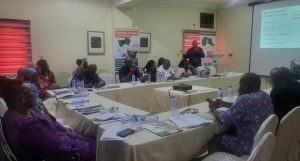The National Agricultural Biotechnology Development Agency (NABDA) has advised farmers to cultivate Genetically Modified (GM) crops to reduce the use of pesticides and save production cost.

Prof. Abdullahi Mustapha, NABDA Director-General, disclosed this at a biotechnology and biosafety sensitisation workshop for senior editors of national media outlets in Abuja on Friday, July 21, 2023.
He said many farmers who planted GM beans seed on their farms had recorded significant drop in the number of times they sprayed chemicals to control pests.
“Already, we have testimonies from farmers across the country who are benefiting from products of modern biotechnology in the country.
“This includes the Pod Borer Resistant (PBR) cowpea, which is helping farmers overcome the devastating impacts of marcuca vitrata that causes 80 per cent destruction on the farmers’ field.
“Today, our farmers are applying only two insecticide sprays as against between eight and 10 sprays previously as a result of planting the PBR Cowpea.
“Our farmers are also planting Bt. Cotton, another innovative product from modern biotechnology, that is changing the game in cotton farming, and the hope of the textile industry revival is on course,” Mustapha said.
The director-general said the workshop was aimed at enlightening the editors on new trends in biotechnology, in line with the Federal Government’s determination to improve the agricultural sector of the economy.
“Biotechnology is a transformative force that holds immense potential to address some of the most pressing challenges facing Nigeria and the world at large.
“From healthcare to agriculture, energy to environment, biotechnology offers solutions that can significantly impact on the well-being of our citizens and the sustainability of our resources.
“As editors, you play a pivotal role in shaping public opinion and disseminating information. The power of media in shaping narratives and public perception cannot be overstated.
“Hence, your role in communicating agricultural biotechnology to the masses is crucial for fostering understanding, dialogue, and informed decision-making,” he said.
Dr Rose Gidado, the agency’s Director, Agricultural Biotechnology, said editors were selected to add value to general reportage on biotechnology and biosafety.
“We have to bring in the editors to educate them because most times we deal with reporters and sometimes the reporters may not get what they want after their stories have been edited by the editors. So the editors too need to understand this technology,” she said.
Mr Yusuf Alli, Managing Editor, Northern Operation, the Nation Newspaper, said his perception about biotechnology crops changed after attending the workshop.
“I came here with bias; I have never been a believer in biotechnology products. I used to see biotech experts as tempting God, but I have a different perception now.
“If we want to increase our yield, then we should look the biotechnology direction,” Alli noted.
The aim of the sensitisation workshop was to provide accurate and up to date information about advances in the agricultural biotechnology sector since its adoption in Nigeria.
By Bukola Adewumi
